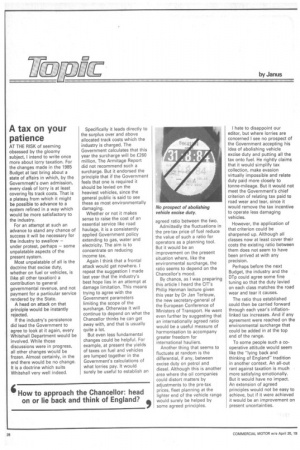A tax on your patience
Page 30

If you've noticed an error in this article please click here to report it so we can fix it.
by Janus
AT THE RISK of seeming obsessed by the gloomy subject, I intend to write once more about lorry taxation. For the changes made in the 1985 Budget at last bring about a state of affairs in which, by the Government's own admission, every clas6 of lorry is at least covering tits track costs. That is a plateaa from which it might be possible to advance to a system refined in a way which would be more satisfactory to the industry.
For an attempt at such an advance to stand any chance of success it will be necessary for the industry to swallow — under protest, perhaps — some unpalatable aspects of the present system.
Most unpalatable of all is the doctrine that excise duty, whether on fuel or vehicles, is (like all other taxation) a contribution to general governmental revenue, and not payment for a particular service rendered by the State.
A head on attack on that principle would be instantly rejected.
If the industry's persistence did lead the Government to agree to look at it again, every Whitehall Department would be involved. While those discussions were in progress, all other changes would be frozen. Almost certainly, in the end there would be no change. It is a doctrine which suits Whitehall very well indeed. Specifically it leads directly to the surplus over and above allocated track costs which the industry is charged. The Government calculates that this year the surcharge will be £260 million. The Armitage Report did not recommend such a surcharge. But it endorsed the principle that if the Government feels that one is required it should be levied on the heaviest vehicles, since the general public is said to see these as most environmentally damaging.
Whether or not it makes sense to raise the cost of an essential service like road haulage, it is a consistently applied Government policy extending to gas, water and electricity. The aim is to concentrate on reducing income tax.
Again I think that a frontal attack would get nowhere. I repeat the suggestion I made last year that the industry's best hope lies in an attempt at damage limitation. This means trying to agree with the Government parameters limiting the scope of the surcharge. Otherwise it will continue to depend on what the Chancellor thinks he can get away with, and that is usually quite a lot.
But even less fundamental changes could be helpful. For example, at present the yields of taxes on fuel and vehicles are lumped together in the Government's calculations of what lorries pay. It would surely be useful to establish an agreed ratio between the two.
Admittedly the fluctuations in the pre-tax price of fuel reduce the value of such a ratio for operators as a planning tool. But it would be an improvement on the present situation where, like the environmental surcharge, the ratio seems to depend on the Chancellor's mood.
By chance, as I was preparing this article I heard the CIT's Philip Henman lecture given this year by Dr Jan Terlouw, the new secretary-general of the European Conference of Ministers of Transport. He went even further by suggesting that an internationally agreed ratio would be a useful measure of harmonisation to accompany greater freedom for international hauliers.
Another thing that seems to fluctuate at random is the differential, if any, between excise duty on petrol and diesel. Although this is another area where the oil companies could distort matters by adjustments to the pre-tax prices, fleet planning at the lighter end of the vehicle range would surely be helped by some agreed principles. I hate to disappoint our editor, but where lorries are concerned I see no prospect of the Government accepting his idea of abolishing vehicle excise duty and putting all the tax onto fuel. He rightly claims that it would simplify tax collection, make evasion virtually impossible and relate duty paid more closely to tonne-mileage. But it would not meet the Government's chief criterion of relating tax paid to road wear and tear, since it would remove the tax incentive to operate less damaging vehicles.
However, the application of that criterion could be sharpened up. Although all classes now at least cover their costs the existing ratio between them does not seem to have been arrived at with any precision.
Perhaps before the next Budget, the industry and the DTp could agree some fine tuning so that the duty levied on each class matches the road wear and tear it causes.
The ratio thus established could then be carried forward through each year's inflationlinked tax increases. And if any agreement were reached on the environmental surcharge that could be added in at the top end of the range.
To some people such a cooperative attitude would seem like the "lying back and thinking of England" tradition in another context. An all-out rant against taxation is much more satisfying emotionally. But it would have no impact. An extension of agreed principles would not be easy to achieve, but if it were achieved it would be an improvement on present uncertainties.




















































































